As an Amazon Associate I earn from qualifying purchases.
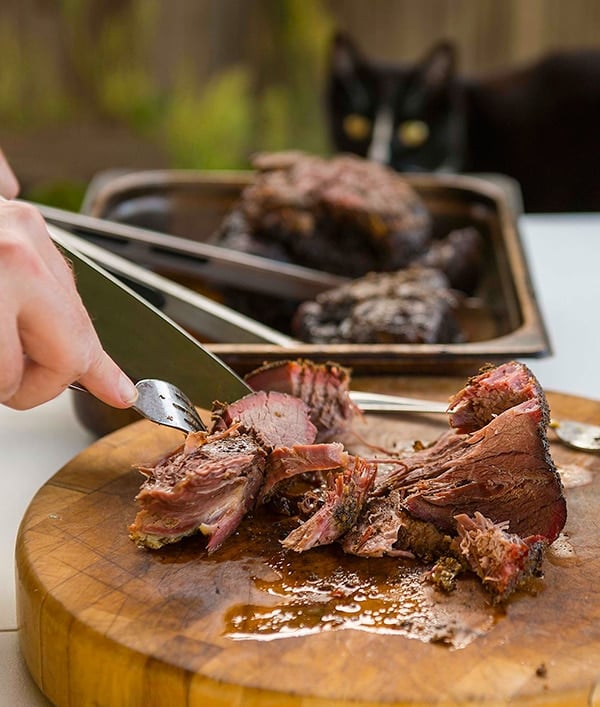
Wild hog BBQ is a bit different from your typical pulled pork barbecue, but it’s pretty easy — if you have patience.
Wild, or rather feral, pigs tend to be older than farmed ones, and they’re athletes by comparison.
This results in two things when it comes time to slap a wild hog butt on the BBQ: First, wild pigs will likely have a lot less fat, and almost no marbling within the shoulder meat itself. Second, the connective tissue within the shoulder itself will be much, much fiercer than it would be in a largely sedentary farmed pig.
The fat problem means you need to be careful not to let the wild pork dry out, and the connective tissue problem means you will likely need to wait a lot longer for your wild hog BBQ than you would with a Costco pork butt.
But when it’s all said and done, it’s worth it.
What you get when you’re finished is intensely porky pulled pork that doesn’t really need a BBQ sauce, although you can certainly use one if you want. My go-to is a South Carolina mustard-style sauce I use a lot on quail. You can use whatever you’d like, or, as I said, no sauce at all.
So how do you get there? You start by salting your wild pork shoulder — it can be boneless or bone-in — and keeping it in the fridge for a few hours, a day, or even up to a few days. The longer you leave it, the saltier it will get. I wouldn’t leave the salt on a shoulder for more than three days.
Rinse off the salt, add a dry rub if you want — or not. If you’re not using a dry rub, pat the meat dry before you put it in your smoker.
I prep my wild pig shoulder for the barbecue by lining a tray with heavy foil, leaving enough extra around each side that I can use the foil to wrap the pork later. Set the shoulder in the tray and set that in the barbecue.
In a perfect world, you smoke at about 200°F. But with wild hog BBQ that means you probably won’t be eating dinner for about 12 hours, especially if you employ this not-so-secret ‘cue tip: Set the meat in the barbecue cold, as in right out of the fridge. Why? You get a better smoke ring, that pretty red ring around the edges of the meat. This ring stops developing around 140°F, so the longer it takes to get the meat up there, the better the ring.
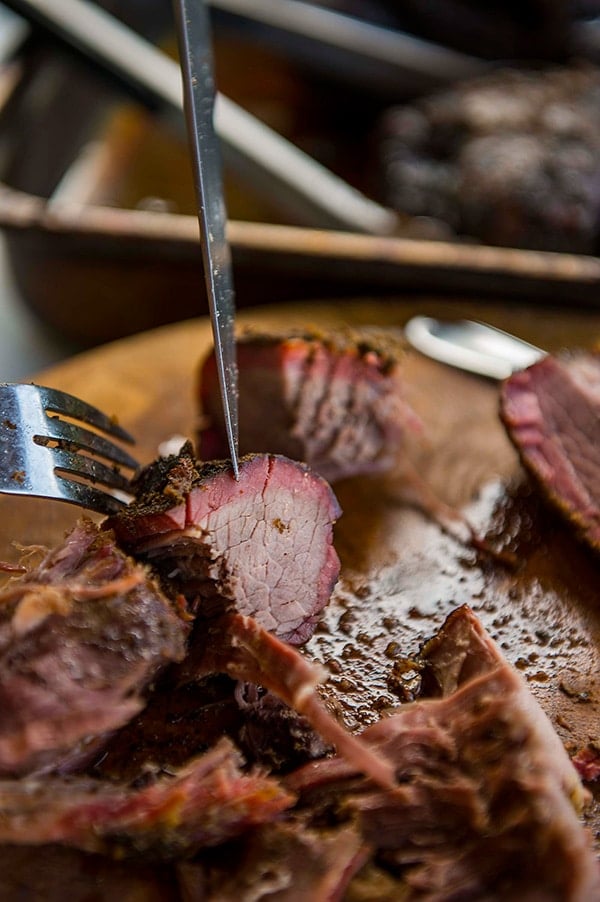
If you are pressed for time, you can barbecue up to about 250°F, but the results won’t be as wonderful. Many folks like 225°F as a happy medium.
What wood? Your call. I prefer hickory, pecan or oak. But you can use whatever makes you happy.
Flip your pork shoulder every hour or so to make sure it gets even smoke. I only apply smoke to the meat for four to six hours because I think it balances the flavor of the wild hog with that of the smoke.
There’s another reason: After about four to six hours, you will want to wrap your wild hog shoulder up in that foil to prevent it from drying out. The whole rest of the way is just waiting for that gnarly connective tissue I mentioned at the top of this post to melt — and that takes time. It won’t even start happening until the meat hits about 160°F internally, and doesn’t really get going until 180°F. Most BBQ gurus like a pork shoulder to actually hit 200°F internally.
This is not a bad idea with wild hogs, because of the strength of the connective tissue… but remember there’s no internal fat. What to do? I cheat.
When it comes time to pull your pork shoulder (I do it with two forks), have a little bacon fat or rendered lard or even butter lying around. Mix that in when you are pulling, and you’ll thank me.
Eat your wild hog BBQ on a bun with cole slaw, or bunless, or really however you want.
Wild Hog BBQ
Ingredients
- 1 4 to 8 pound wild hog shoulder, boneless or bone-in
- Salt
- Dry rub of your choice
- Barbecue sauce of your choice
- 1/4 to 1/2 cup bacon fat, lard or butter
Instructions
- Sprinkle salt all over the pork shoulder, getting it into every crevice. Put the meat in a covered container in the refrigerator for at least 1 hour and up to 3 days. I like a solid 24 hours.
- Rinse the meat and coat with the dry rub of your choice. If you're not using a dry rub, either use black pepper or pat the meat dry. Set foil in a tray that will hold the pork shoulder, leaving enough extra foil around the edges so you can wrap the meat later.
- Get your smoker going. If you have lots of time, set it to 200F. A happy medium is 225F, but don't go higher than 250F. Set the meat in the tray and put it in the smoker.
- Flip the pork shoulder every hour so it gets even smoke. Smoke like this for at least 4 hours, and up to eight; I prefer about six hours.
- Now wrap the meat tightly in the foil and continue to cook until it's done and is shreddable, anywhere from another hour or two for a young hog or store-bought pig, to another eight hours for an old hog. You can do this in an oven, too.
- Shred the meat with a pair of forks, and mix in the bacon fat. If you find yourself with long, stringy threads of meat, chop it a bit so it works better as a sandwich. Serve with the barbecue sauce of your choice on a bun with cole slaw.
Nutrition
Nutrition information is automatically calculated, so should only be used as an approximation.

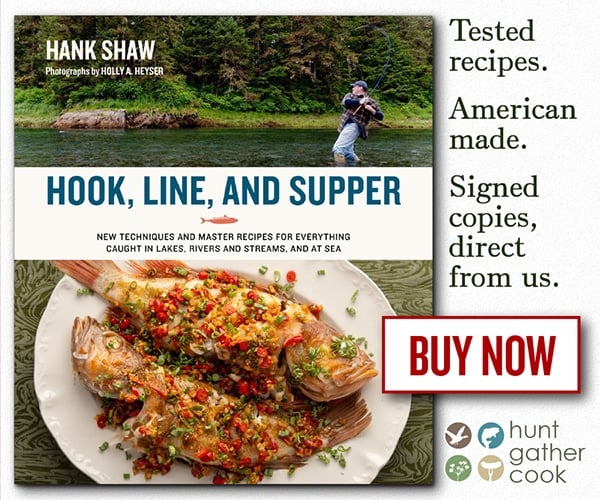
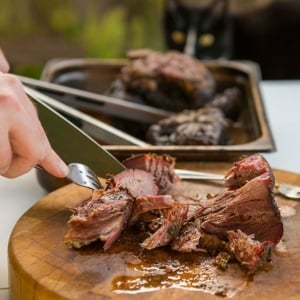
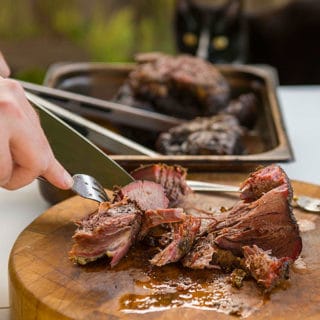
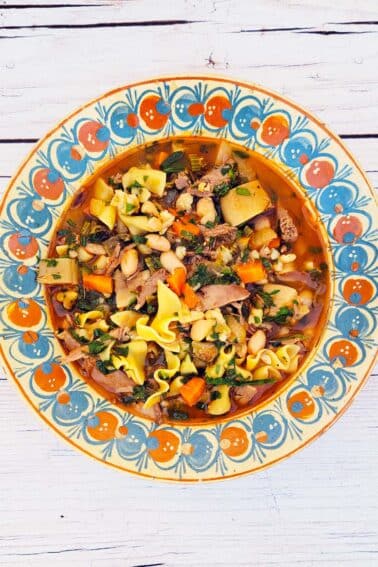
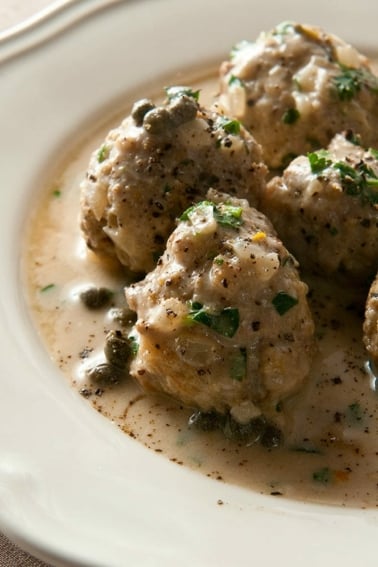
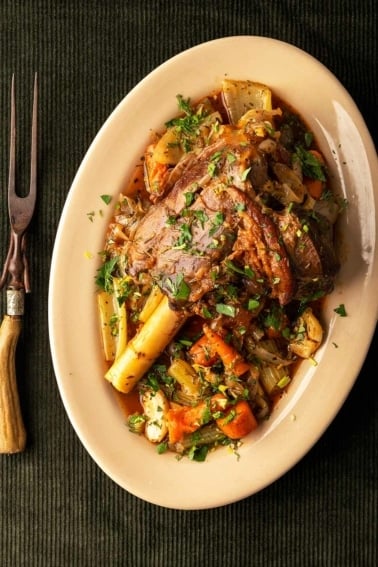
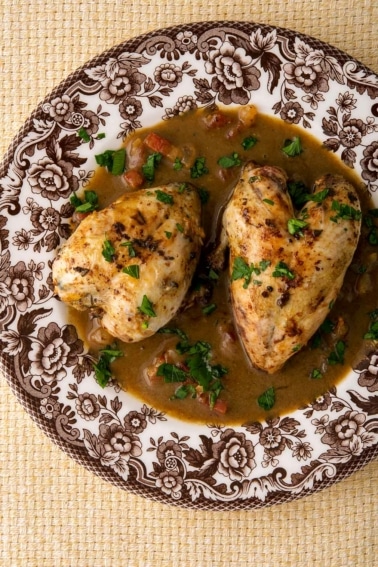
I did not brine but smoked to 205 and it was not shrewdable. We sliced thin and flavors were excellent. Just didn’t shred.
Hi Hank! A friend gave us a young wild pig, skinned and quartered. My husband is a hunter but hasn’t hunted hogs. He knows how to process the meat and did so in short order. I know how to cook and what to do with various cuts. But there are 2 packages of small scraps of good meat. I’m not sure what is best to do with this. My husband says it’s not enough to mess with making sausage. Should I put it in the slowcooker or ?
Deb: Yep. Sounds like it would be great for a pork-based stew! Maybe try pozole?
Texas clutch it in apple juice to finish. Along with the added fat pour some of the residual juice in while pulling. Thank me later.
How does this work with a ham (small wild Hog) @5#?
I can’t wait to try this, but I have a question. My wild hog was deboned so I could bring it home and therefore I have just chunks of meat. I also have a new vertical smoker, 5 and 1 series, Louisiana smoker, from Costco. Should I put the meat directly on the rack or put the pieces inside an aluminum pan with foil on the top?
Monica: Deboned is fine. I’d put it on a rack above a tray to catch juices, and then you’ll wrap it in foil later in the process.
Can you use a wet brine (beer apple juice salt spices) kind of brine or is it best to just salt the meat at let rest wrapped in the fridge…. ??? Thanks Kyle
Kyle: Either way works. If you use the wet brine, just don’t leave it in there too long or the meat will get very salty.
so 225 at 8 hours?
Matthew: Between 200F and 225F, yes. And the 8 hours is relative. If you have a young wild hog, it could take less, and it it was very old, more time. BBQ is not an exact science, as you know.
I smoked a whole wild pig shoulder for the 4th of July. I rubbed it with Ras El Hanout, and smoked with hickory, which ended up being great choices. It really did take a full 8 hours to cook, the last two wrapped in foil. That was the ticket! Super moist. We ate it fork shredded, with a homemade blueberry chipotle BBQ sauce.
We are having wild boar for lunch today (ribs) and I prepared it as you said. We received half a young female as a fabulous gift and I must confess that the ham was THE best pork we have ever tasted.
Just moved this to the top of my to-do list…
Any thoughts on soaking your shoulder in a brine before smoking?
I’ve been experimenting with a 2-3 day basic brine with good success so far. Seems to help with keeping the moisture up on a long smoke. Also helps flush out some of that gamey taste we get in our east Texas pigs
Trevor: you can absolutely do that.
Hey Hank, just wondering if you are at all concerned with NOT having pink salt in the mix. I never was but in making sausage etc and reading all the literature it seems that the consensus really is 200° F smoke, moisture, and no oxygen puts you where you need to be for botulism.
I have battled with this “thought” for awhile and because I do smoke a bit hotter have fallen on the same side…no pink salt but as my temp drops I do start to wonder.
thoughts?
Scott: I’ve never worried about it, as it’s the same process for domestic BBQ and no one ever gets botulism from BBQ.
My understanding is that if you’re dealing with a large intact chunk of meat that was handled properly there is little risk from botulism, as the bacterium would not have been introduced to the internal parts of the meat from cutting or grinding.
What would you think of taking that bacon “butter” or lard and heating up some good ole beef broth and sprinkling the pulled meat with the liquid? We’ve put a bit of broth on our finished pulled pork before but not the additional fat since our domestic pork butt already had it. I just wonder if melting the fat in a hot liquid would spread it to the meat a bit easier.
Marisa: It’s definitely something you can do. I may try that next time – thanks!